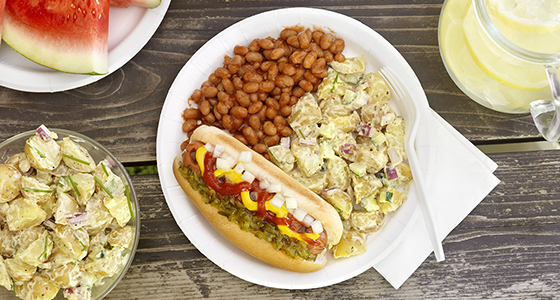
Summer Food Safety: 9 Tips to Prevent Foodborne Illness
Incorporate these tips into your plans for outdoor gatherings this summer to help ensure your plans and your food aren't spoiled.

After several months of staying in, meteorological summer has arrived, and people are ready to get out of the house and responsibly enjoy time with loved ones. Barbeques, picnics, bonfires, camping, and other food-focused outdoor gatherings provide an excellent way to gather safely, but if you aren’t careful, your long-anticipated time with family and friends could result in miserable memories of a foodborne illness.
We asked four of our IFT Food Science Member Experts – Christine Bruhn, PhD, Robert B. Gravani, PhD, CFS, Aurora Saulo, and Don Schaffner, PhD – for their tips on keeping food safe this summer.
- Plan ahead. Do as much advanced preparation as possible at home where you have all the necessary equipment and utensils. Pre-wash all fruits and vegetables and keep them stored in the refrigerator until it’s time to pack the cooler. Completely and safely thaw any frozen meats in the refrigerator before taking them to the outdoor venue. Store marinating meats in the refrigerator before transferring them to a cooler.
- Carefully consider your coolers. Pack raw meats separately from ready-to-eat foods, such as prepared salads, fresh fruits, and vegetables, and have a separate cooler for cold beverages. Also, remember that ice you are planning to consume should be kept separate from the ice used to cool food and beverages in the cooler.
- Always use a meat thermometer. Color alone is not a sufficient method of measuring whether cooked foods have reached a safe internal temperature. Consult the Safe Minimum Cooking Temperatures Chart for guidelines for meat, poultry, seafood, and other cooked foods.
- Keep it clean. Make sure there are plenty of clean plates and utensils. You never want to use the same plates or utensils for raw and cooked meat, so be sure to have a clean plate on hand for foods coming off the grill or smoker.
- Keep hot foods hot (more than 140°F) and serve them right away. Otherwise, cover foods with aluminum foil or set them to the side of the grill rack to keep them hot until serving. Try to estimate exactly what you need so there are no leftovers.
- Keep cold foods cold (less than 40°F). Make sure you have plenty of ice or freezer gel packs available to keep foods in the cooler cold, and place the cooler under an umbrella, tarp, or in the shade for added protection from sun and heat.
- For best safety and quality, refrigerate leftovers within two hours. If the temperature is above 90°F/32°C, make that one hour.
- Discard all marinades used for marinating meats and any leftover perishable foods after two hours.
- Bring extra drinking water or potable water to use for washing hands after handling raw food and before eating. Using hand sanitizers does not replace hand washing.
There are plenty of health guidelines to consider in the wake of COVID-19. Incorporating these tips into your plans for outdoor gatherings will help you ensure your plans remain safe and your food isn’t spoiled.
CONTRIBUTORS
Christine Bruhn, PhD, is the cooperative extension specialist emerita at University of California, Davis.
Robert B. Gravani, PhD, CFS, is professor emeritus of food science at Cornell University.
Don Schaffner, PhD, is an extension specialist in food science and distinguished professor at Rutgers University.
Aurora Saulo is a professor and extension specialist in food technology University of Hawaii.
